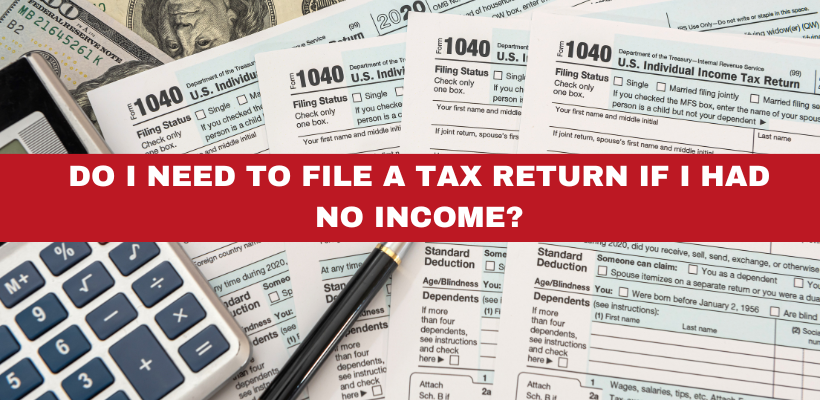If you had no income last year, you might be wondering: “Do I need to file a tax return?” Since there’s nothing to report, skipping tax season might seem like a no-brainer. But depending on your situation, filing taxes with no income could still be a good idea…or even required. Let’s break it down so you know what to do.
When you don’t need to file a tax reutrn
Generally, if you had zero income and no other special circumstances, you’re not required to file a federal tax return. The IRS sets income thresholds each year, and if your gross income is below these levels, filing isn’t necessary.
For example, in 2024, the filing thresholds were:
- Single and under 65: Gross income of $14,600 or more.
- Single and 65 or older: Gross income of $16,550 or more.
- Married filing jointly, both under 65: Combined gross income of $29,200 or more.
If your income was below these amounts, you typically don’t need to file.
When you might want to file a tax return anyway
Even if you didn’t earn any income, there are some situations where filing a return could actually benefit you.
- Self-employment. If you earned $400 or more from self-employment (like freelancing or gig work), you’re required to file a tax return.
- Tax credits. You might be eligible for refundable tax credits, such as the Earned Income Tax Credit (EITC) or the Child Tax Credit. Filing a return is the only way to claim these credits and potentially receive a refund.
- Health Insurance marketplace. If you had health insurance through the Marketplace and received advance premium tax credits, you need to file a return to reconcile those credits.
- Withheld taxes. If an employer withheld taxes from your paycheck during part of the year when you had income, filing a return allows you to claim a refund of those withheld amounts.
What happens if you don’t file a tax return if you had no income?
If you’re not required to file and you don’t file, generally there won’t be any penalties. After all, there’s no income for the IRS to tax. However, if you’re eligible for a refund or credit, you’ll lose out on that money if you don’t file. In the case of refundable credits like the EITC, it could be worth your while to file even if you didn’t have any income.
How to Determine Your Filing Requirement
The IRS offers an online tool to help you figure out if you need to file a tax return. By answering a few questions about your income, filing status, and other factors, you can get a clear answer tailored to your situation.
Final Thoughts
If you had no income and none of the special circumstances mentioned apply to you, you’re likely not required to file a tax return, but there are exceptions. Filing could help you receive a refund or tax credit. If you are unsure, it’s always a good idea to use the IRS’s online tool or consult with a tax professional who can help you figure out what is best for you. The last thing you want is to miss out on money you’re owed or to miss a filing deadline if it turns out you should have filed after all!







 Steven N. Klitzner, P.A. is a tax attorney based in Miami, Florida. He has been practicing tax law for over 40 years, and currently holds a 10.0 rating by Avvo. Mr. Klitzner was appointed to the IRS Service Advisory Council in 2021 and is...
Steven N. Klitzner, P.A. is a tax attorney based in Miami, Florida. He has been practicing tax law for over 40 years, and currently holds a 10.0 rating by Avvo. Mr. Klitzner was appointed to the IRS Service Advisory Council in 2021 and is... 





